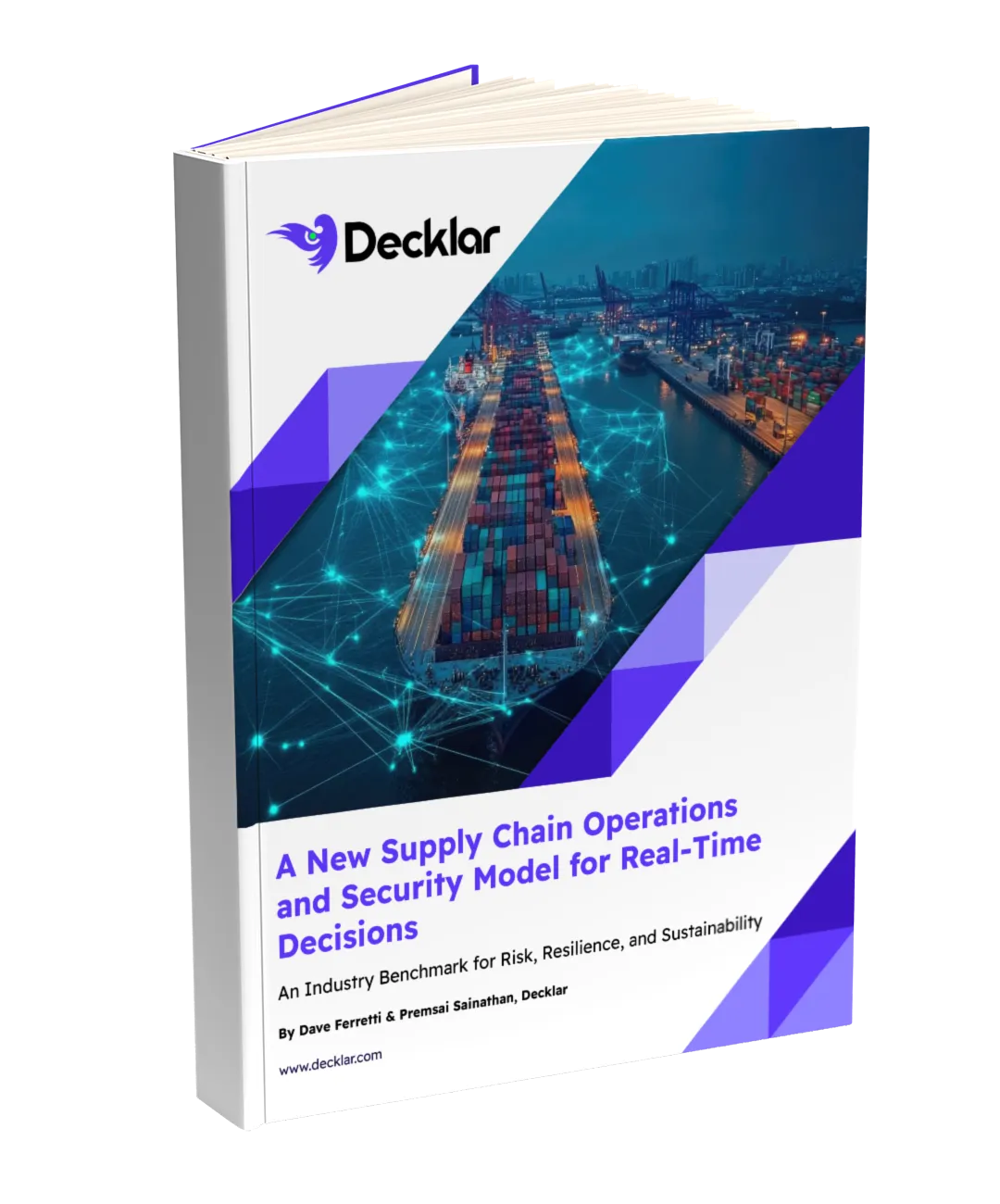Sip Sustainably: ROI of Decision AI in Global Wine Supply Chains

Introduction
In today’s wine industry, sustainability is not just a trend. It’s a necessity. Consumers and regulators alike are demanding transparency, environmentally responsible practices, and consistent product quality. These demands present both challenges and opportunities. By adopting platforms built for real-time decision-making, global wine companies can position themselves as a trailblazer in sustainable supply chain management, unlocking operational efficiency and environmental performance.
Decklar helps companies achieve this transformation by equipping their supply chains with the intelligence needed to act instantly, predict outcomes, and optimize both business and sustainability goals.
Key Supply Chain Challenges Dominating the Wine Industry
1. Carbon Footprint Monitoring
Customers in key markets demand detailed tracking of transportation emissions. Transparent reporting and reduction of these emissions are essential for meeting regulatory standards and consumer expectations.
Markets like Scandinavia (monopoly markets) and the USA (agent markets) are emphasizing sustainability, requiring stringent monitoring of transportation emissions, packaging, and environmental conditions (such as temperature and humidity). From Napa to Bordeaux, Adelaide to Cape Town, wine producers must balance emissions monitoring with premium product preservation
Without this, companies risk losing market share and failing to capitalize on eco-conscious branding opportunities.
2. Theft Risk Across the Distribution Chain
Wine is vulnerable to theft during domestic shipments, at ports, and during first and last mile delivery. This leads to financial loss, shipment replacements, increased emissions, and higher insurance costs. These inefficiencies hamper sustainability goals and erode customer trust due to delayed deliveries and profit margins.
Decklar’s Security Risk Anticipation solution delivers predictive alerts for route deviations, port congestion, and unauthorized access thus reducing spoilage and asset loss before it happens.
3. Temperature and Environmental Control
Wine shipments must be transported within consistent temperature and humidity ranges conditions to maintain quality. A lack of real-time monitoring risks spoilage, financial losses, and damages to a company’s reputation.
4. Limited Control Over International Container Shipments
Movement Tracking: Lack of visibility into container locations leads to delays, demurrage charges, and escalated storage fees , disrupting logistics and customer commitments.
Condition Monitoring: Long voyages expose wine shipments to fluctuating environmental risks. Without condition monitoring, the product quality degrades, leading to financial losses and dissatisfied customers.
Driving Impact with AI-Powered Decisions, Backed by Visibility
The adoption of a Decision AI Platform, powered by real-time visibility, is pivotal in transforming operations for wine supply chains. Decklar enables producers to integrate advanced analytics with real-time operational signals through its Integration Hub that connects it’s Decision AI platform with ERPs, 3PLs, and IoT platforms seamlessly.
This enables companies to achieve critical operational milestones and performance targets.
1. Carbon Footprint Reduction
Transparent tracking empowers optimized routes, reduced emissions, and enhanced eco-friendly branding, aligning with the growing demand for sustainable practices.
2. Operational Efficiency
Real-time theft detection and prevention minimize losses, reduce re-shipments, and preserve resources This leads to significant cost savings and improved efficiency.
3. Product Integrity
Continuous environmental monitoring, powered by an Automated Quality Risk Monitoring & Release solution, ensuring ideal transportation conditions, preventing spoilage, preserving quality, and reducing waste while reinforcing a reputation for excellence.
Quantifiable ROI Beyond Sustainability
AI-powered decision-making and real-time insights are already delivering measurable results for wine logistics by addressing these key challenges.
1. Logistical Bottlenecks (Domestic Distribution)
- 20% reduction in fuel consumption through intelligent route optimization using Dynamic Replenishment Planning.
- 15% decrease in transportation costs by avoiding demurrage, detention, and storage fees.
- Improved delivery reliability boosts customer satisfaction and loyalty.
2. Theft Risk ( Across the Distribution Chain)
- 40% reduction in theft-related losses with real-time monitoring and alerts via Security Risk Anticipation.
- 20% lower insurance premiums due to reduced risks.
- Fewer re-shipments cut operational costs and improves resource efficiency.
3. Temperature and Environmental Control
- 35% reduction in product spoilage through continuous condition monitoring.
- Financial savings from fewer spoiled products and less waste.
- Higher customer satisfaction by maintaining product quality.
4. Ocean Container Monitoring (Movement Tracking)
- 20% reduction in delays by accurately predicting ETAs to port & warehouse and through optimized gate movements.
- 95% demurrage fees reduction by avoiding costly port delays.
- Smarter logistics planning reduces inefficiencies and costs.
5. Ocean Container Monitoring (Condition Visibility)
- 30% reduction in product damage during transit with environmental monitoring.
- 25% decrease in spoilage and losses from improper handling or fluctuating conditions.
- Reduced cost from re-shipments, improved quality assurance, and a reduced carbon footprint per SKU
Implementation: Lessons from Industry Leaders
Leading wine companies worldwide have illustrated the power of visibility and sustainability:
1. Constellation Brands
- Achievements: Implemented AI-based route optimization and real-time shipment tracking; adopted eco-friendly packaging practices.
- Outcome: Enhanced customer satisfaction, improved shipment timing, reduced emissions, and strengthened sustainability branding across global markets.
2. Treasury Wine Estates (TWE)
- Achievements: Leveraged temperature-controlled logistics to minimize spoilage and route optimization for reduced emissions.
- Outcome: Lower logistics costs and boosted credibility in sustainability-focused regions such as the Nordic region and California.
3. E. & J. Gallo Winery
- Achievements: Deployed advanced logistics software to streamline transport operations and ensure quality during transit.
- Outcome: Reduced spoilage and delays while enhancing customer satisfaction and lowering operational costs.
4. Accolade Wines
- Achievements: Improved shipment monitoring and sustainable packaging reduced environmental impact.
- Outcome: Lowered operational costs and reinforced brand loyalty in environmentally conscious segments.
Leading the Way in Wine Logistics
Wine logistics is being redefined by real-time decision-making, not static insights. As the wine industry evolves, leaders are moving away from reactive workflows and embracing proactive, AI-driven orchestration.
Decklar enables wine producers to meet sustainability mandates, reduce losses, and improve margins without expanding infrastructure. The outcome is a smarter, sustainable, and more resilient supply chain that delivers measurable results and long-term value.
In today’s competitive and climate-conscious landscape, intelligence isn’t optional. It is a differentiator.
Discover how Decklar’s AI-native platform delivers real-time decisions, smarter logistics, and measurable impact – without added infrastructure
Request a Personalized Demo to see it in action.

Premsai Sainathan, Vice President – Growth, Decklar
Premsai Sainathan (Prem) is the Vice President of Growth at Decklar, responsible for accelerating the company’s business through scalable demand generation, marketing, branding, communications, and revenue enablement. With over 12 years of entrepreneurial experience, Prem helped Decklar launch its offerings across key markets, establishing early product-market fit, setting up revenue teams, and creating repeatable go-to-market strategies. Prior to Decklar, Prem co-founded and successfully built Skope Solutions, an IoT-enabled indoor positioning solutions firm serving manufacturing, supply chain, and healthcare sectors. He has also contributed to the Laser Interferometer Gravitational-Wave Observatory (LIGO), backed by the National Science Foundation (NSF). Prem holds a Master of Science in Mechanical Engineering from the University of Florida, USA and is a published author and speaker in various industry publications and events.



